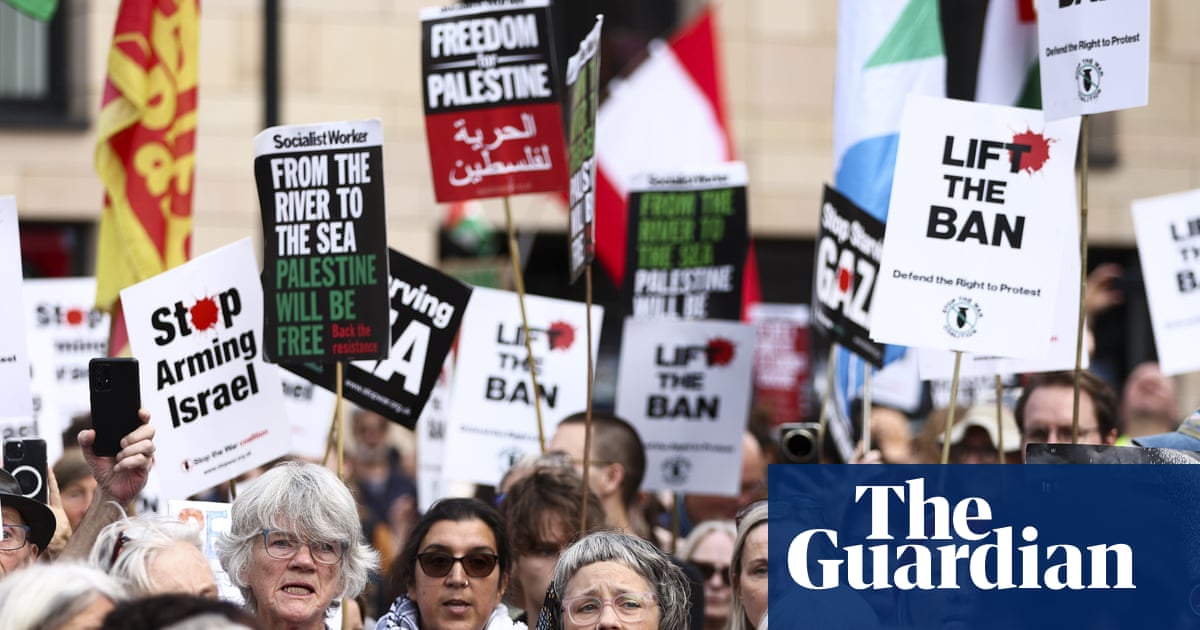A former British diplomat has served a petition challenging the ban on Palestine Action in Scotland.
The case, brought by Craig Murray, is separate to the judicial review of the proscription decision being brought at the high court in London and could lead to a situation whereby the ban is ruled unlawful in Scotland but not in England and Wales.
Defend Our Juries, which has been organising protests in support of Palestine Action, the first direct action protest group to be proscribed under the Terrorism Act, said such an outcome would herald a “constitutional crisis”.
Murray, who was the British ambassador to Uzbekistan from 2002 to 2004, served notice on the Scottish solicitor general, Ruth Charteris KC, on Friday. The next stage will be a hearing to decide whether the case can proceed to trial.
Craig Murray, who was the British ambassador to Uzbekistan from 2002 to 2004, has served notice on the Scottish solicitor general. Photograph: Andy Buchanan/AFP/Getty
He is arguing that the proscription order contravenes the rights to freedom of speech and assembly under the European convention of human rights and that Palestine Action should have been consulted before it was imposed.
A judicial review of the ban brought by Palestine Action’s co-founder Huda Ammori is due to be heard at the high court in London in November, subject to a decision by the court of appeal as to whether it should proceed after an attempt by the Home Office to block it.
The legal challenge in Scotland raises the prospect of a similar situation arising as in the case of Boris Johnson’s decision to prorogue parliament, which Scottish appeal court judges ruled was unlawful, but the high court in London held to be lawful. In that case, the situation was resolved by the UK supreme court, which agreed with the Scottish judges.
Murray’s application to the court of session argued that he was entitled to bring the case because he had, before the ban coming into effect on 5 July, expressed support for Palestine Action and had previously participated in protest activities organised by the group.
On clearing the first hurdle to a legal challenge, he said: “It is a maxim in Scots law that the law cannot be absurd. To claim that Palestine Action is a terrorist organisation is plainly absurd. This proscription is a politically motivated action in support of a genocide and it is poisoning Scottish civil society. Entirely peaceful protesters are being arrested and charged as terrorists.”
skip past newsletter promotion
Get the day’s headlines and highlights emailed direct to you every morning
Privacy Notice: Newsletters may contain information about charities, online ads, and content funded by outside parties. If you do not have an account, we will create a guest account for you on theguardian.com to send you this newsletter. You can complete full registration at any time. For more information about how we use your data see our Privacy Policy. We use Google reCaptcha to protect our website and the Google Privacy Policy and Terms of Service apply.
after newsletter promotion
Among those arrested in Scotland under the Terrorism Act on suspicion of supporting Palestine Action have been people allegedly wearing T-shirts saying “Genocide in Palestine, time to take Action”.
A spokesperson for Defend Our Juries said: “We wholeheartedly support this legal challenge and the Scottish people’s right within their legal system to seek to overturn this absurdly authoritarian ban which has been imposed by Westminster.
“With Scotland’s legal system prioritising the rights and sovereignty of the people rather than the English doctrine of the supremacy of parliament, this legal challenge is on strong legal footing. The potential for a constitutional crisis created if Scottish and English courts reach different decisions, further demonstrates that this ban is simply not enforceable.”
A Scottish government spokesperson said it would not comment on live proceedings.
A UK Home Office spokesperson said: “Palestine Action has conducted an escalating campaign involving not just sustained criminal damage, including to Britain’s national security infrastructure, but also intimidation and, more recently, alleged violence and serious injuries to individuals.”
